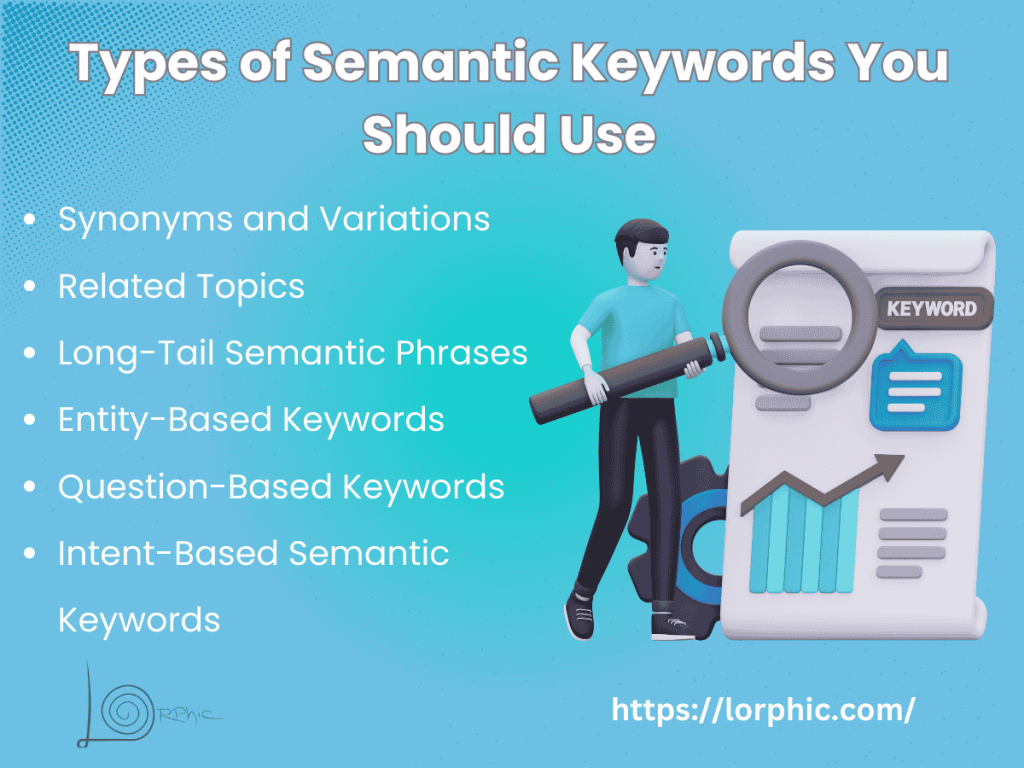Search engine optimization has changed more in the last few years than it did in the decade before it. Today, ranking is no longer about repeating the same keyword throughout your page. Google’s AI driven algorithms focus on understanding the deeper meaning behind content, the intent of the user, and the relationships between ideas. This shift is exactly what is the importance of semantic keywords in SEO.
What are Semantic Keywords?
Semantic keywords are meaningfully related words and phrases that help search engines understand the deeper context of your content. Instead of relying on one exact-match keyword, Google now evaluates how well your content explains a topic, connects related ideas, and satisfies user intent. This shift allows search engines to interpret meaning the way humans naturally do.
For example, if your primary keyword is “what are semantic terms in SEO”, relevant semantic keywords may include:
- search intent
- contextual keywords
- natural language phrases
- user questions
- related concepts
These supporting terms help Google identify what your content is truly about, determine whether it provides a complete answer, and assess how well it aligns with user expectations. They also strengthen the relationship between different entities and concepts, making your content more semantically rich.
In 2025, semantic keywords play an essential role in search visibility. They enhance topical relevance, improve how Google’s AI models interpret your content, and support the overall effectiveness of semantic SEO in content marketing.
How Google Understands Semantic Keywords?
Google’s approach to understanding content has evolved significantly over the years. Algorithms such as Hummingbird introduced semantic search, RankBrain brought machine learning into ranking, BERT improved natural language understanding, and MUM enabled AI-driven, multilingual, and multimodal search. Today, ongoing updates to the Search Generative Experience further refine how Google interprets content.
When it comes to semantic keywords, Google evaluates more than just exact words. It looks at context, intent, and the relationships between concepts to determine the meaning of your content. For example, a page about a semantic SEO strategy should include related terms like search intent, topical depth, entities, keyword variations, and supporting subtopics. These terms help Google understand the full scope of the topic and how well your content addresses it.
Google also matches content to user intent. For instance, someone searching for how to do semantic SEO is likely looking for a detailed strategy or step-by-step guide rather than a basic definition. Pages that align closely with this intent are more likely to rank higher. Semantic search means relying on meaning, context, and relationships, not just matching words. According to Wikipedia, modern search engines use semantic embedding and entity understanding to deliver more relevant results.
Another key aspect is identifying relationships between words and entities. Semantic search allows Google to differentiate between multiple meanings of the same word, such as “Apple” the fruit versus “Apple” the company, or “Java” the island versus “Java” the programming language. By understanding these relationships, Google can provide more accurate and relevant search results.
Finally, Google increasingly relies on AI to predict what users mean rather than just what they type. With the ongoing evolution of the Search Generative Experience, appearing in AI-generated summaries requires content that is semantically rich, detailed, and contextually precise.
Importance of Semantic Keywords in SEO
Semantic keywords have become more essential than ever in modern SEO. They help search engines understand content at a deeper level, improve rankings, and enhance user experience. Here’s why they matter in 2025:
They Improve Google’s Understanding of Your Content
Semantic keywords allow Google to grasp the full meaning of your content rather than just matching exact words. By incorporating related terms, connecting concepts, and covering subtopics, your content becomes more comprehensive and meaningful. This depth builds trust and signals expertise to search engines, which can positively impact how your pages are ranked.
They Increase Topical Authority
For competitive topics like semantic SEO or SEO strategy, building topical authority is crucial. Consistently using semantic keywords throughout your content demonstrates to Google that your website provides in-depth, reliable, and expert information on the subject. Over time, this strengthens your authority in the eyes of search engines and improves overall visibility.
They Boost Rankings Across Multiple Variations
Semantic optimization allows a single piece of content to rank for a wide range of related searches, including long-tail variations, user questions, high-intent terms, and conversational queries. Instead of creating multiple articles for each keyword, one well-structured semantic piece can capture a variety of search opportunities, saving time while expanding reach.
They Improve User Experience and Engagement
Content that incorporates semantic keywords is naturally easier to read and more helpful for users. By addressing related topics, answering questions, and providing context, your pages encourage longer time on site, deeper scrolling, higher engagement, and increased conversions. Positive user signals like these further support higher search rankings.
They Increase Your Chances of Appearing in SGE, Featured Snippets, and People Also Ask
Google is more likely to feature content that is semantically rich in quick answer boxes, AI-generated summaries, featured snippets, People Also Ask questions, and knowledge panels. By including relevant semantic keywords and providing thorough, contextually complete content, your pages have a better chance of being highlighted in these high-visibility search features.
Types of Semantic Keywords You Should Use
To make your content more effective and relevant for both users and search engines, it helps to include different types of semantic keywords. Each type plays a unique role in improving context, intent understanding, and topical authority.

- Synonyms and Variations: These are alternative ways to express the same idea. For instance, rather than repeating “semantic keywords” throughout your content, you can use related phrases such as semantic search, contextual keywords, or topic-based optimization. Using variations makes your content read naturally while helping Google understand the topic.
- Related Topics: These keywords expand the scope of your content and add depth. Examples include user intent, search relevance, machine learning, and BERT & RankBrain. Including related topics signals to search engines that your content covers the subject comprehensively.
- Long-Tail Semantic Phrases: These reflect how people naturally search in complete, conversational queries. Examples are “how does semantic search work”, “why context matters in SEO”, and “what keywords should I use for semantic SEO”. Long-tail phrases help capture specific search intent and improve rankings for question-based queries.
- Entity-Based Keywords: Entities are the main “nouns” of your content, such as people, places, brands, events, and factual concepts. Google’s Knowledge Graph relies on entities to connect related information. Including entity-based keywords helps search engines understand the relationships between concepts.
- Question-Based Keywords: These keywords help your content appear in People Also Ask boxes and AI-generated search snippets. Framing content around questions increases visibility in featured search elements.
- Intent-Based Semantic Keywords: These capture the underlying purpose behind a search, such as guides, examples, strategies, best practices, or explanations of meaning. Using intent-focused keywords ensures your content aligns with what users are looking for and improves engagement.
How to Find Semantic Keywords?
One of the simplest ways to start is by using Google Autocomplete. When you type your main keyword into the search bar, Google suggests related queries that are often high-intent and closely connected to your topic. These suggestions provide insight into what users are searching for and the language they use, giving you valuable semantic ideas.
Another effective method is exploring People Also Ask boxes in search results. These boxes highlight common questions related to your primary keyword, offering a rich source of semantic terms. By incorporating these questions and their variations into your content, you can cover user intent more thoroughly and increase your chances of appearing in featured snippets or AI-generated summaries.
Additionally, the Related Searches section at the bottom of Google search results is a goldmine for semantic keyword ideas. These related queries often uncover additional subtopics, long-tail phrases, and contextually relevant terms that you may not have considered. Including them in your content helps build topical depth and signals to search engines that your page comprehensively addresses the subject.
Final Words
Finding and using semantic keywords is essential for creating content that resonates with both users and search engines. Tools like Google Autocomplete, People Also Ask, and Related Searches make it easier to discover high-intent, contextually relevant terms that expand the scope of your topic. By incorporating these semantic keywords naturally into your content, you provide deeper context, answer user questions more effectively, and improve your chances of ranking for a variety of related searches.
Frequently Asked Questions
What are semantic keywords in SEO?
Semantic keywords are related words and phrases that give search engines a deeper understanding of your content’s meaning, helping improve relevance and topical authority.
Why are semantic keywords important in 2025?
In 2025, Google prioritizes context and user intent over exact keywords, making semantic keywords essential for aligning content with AI-driven search results and improving visibility.
How do semantic keywords improve rankings?
They strengthen topic coverage, clarify user intent, and help Google interpret context, which increases the chances of ranking for multiple related queries.
Are semantic keywords the same as LSI keywords?
No, LSI keywords are outdated; semantic keywords focus on meaning, entities, and context, aligning with modern AI and natural language processing algorithms.
How can I find semantic keywords for my niche?
Identify them through Google Autocomplete, People Also Ask, related searches, keyword tools like Semrush and Surfer, NLP tools, and competitor analysis.
Curated by Lorphic
Digital intelligence. Clarity. Truth.




